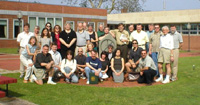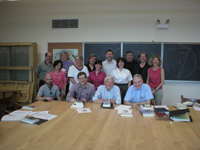|
On Tuesday, March
11th, 2003, the National Endowment for the Humanities announced
the year’s awards for project proposals to the Exemplary Education
Program. ACTC was awarded $ 229,000 for its three-year project,
“Bridging the Gap Between Humanities and Sciences: An Exemplary
Education Model of Core Text, Humanistic Education.” The project
was the first initiative of the ACTC Liberal Arts Institute.
“Bridging the Gap” began in June 2003 on the campus of St.
John’s College.
“Bridging the Gap” is a national curricular project which
unites humanist scholars and scientists in developing and
implementing general, liberal education courses based in the
humanities. The project will develop humanities core text
courses and discussions about the value, meaning, and importance
of science to human ideas, actions, and arts throughout the
West and the World. After a national competition, faculties
from nine institutions have been selected to participate in
the three-year project. Suggested by NEH, funding from outside
sources will increase the participation of the project beyond
its original plans.
The yearly seminars will have two parts. Phillip Sloan, President
of ACTC and Peter Kalkavage of St. John’s College co-authored
the syllabi of science and humanities readings and will lead
the discussions of science and humanities texts for all three
years of the project. Toward the close of each two-week session,
the participating institutions will move into workshops to
plan for integration of the seminar texts into their particular
curricula. Scott Lee, project director, and Patricia Cook,
project evaluator, will help develop the specific integration
plans. Lee commented that “winning this award is an honor
and validation of the potential of ACTC, its institutional
affiliates, and its new Liberal Arts Institute.”
In order to indicate national institutional interest to NEH,
ACTC invited three core text institutions that it knew to
be eager to develop humanities-and-science courses -- Mercer
University, St. Olaf College, and the University of Dallas
-- as partners in the original grant. Subsequently, ACTC held
a national competition to select six more institutions to
participate. Institutions joining the project are Benedictine
University, Norfolk State University, Seton Hall University,
Samford University, St. Bonventure University, and Truckee
Meadows Community College. St. John's College, the University
of Notre Dame, and the University of Dallas (site of ACTC's
new Liberal Arts Institute) agreed to host the three seminars
and generously held costs in check so that ACTC could turn
in a viable proposal. Cost-sharing by institutions in support
of administrators and post-seminar development plans was an
important ingredient of success. Developments of the project
on each campus and as a whole will be made available through
campus and ACTC websites.
As is its policy, the National Endowment for the Humanities,
through program officer Barbara Ashbrook, provided invaluable
guidance in helping to develop this project and superb critical
reviews from the peer reviewers after the grant was awarded.
These helped to improve and finalize the project’s content
and structure.
Both the seminar syllabi and the institutional applications
express the commitment to solid humanistic, interdisciplinary
education in core text, liberal education. The first year
participants will discuss “Motion and Natural Law in a Philosophical
and Political World.” The second year participants will read
about and discuss “The Problem of Life: Life Sciences and
Humanistic Perspectives.” In the third year, discussion will
turn to “Nature, Art, and Science: the Problem of Technoscience
and Values.” Simple experiments, field trips, and films supplement
the effort as do the evening discussions by faculty over dinners
on the hosting campuses. The syllabus will be published on
ACTC’s website this spring, shortly after the conference.
The institutions were extraordinarily broad-ranging in their
integration plans. All met the two-course integration minimum
and went well beyond. Honors colleges modeling for general
education courses, cluster courses supplementing extensive
required course offerings, degree programs linked to the general
education courses, pre-collegiate education linked to the
general education courses, learning communities, supplemental
technology workshops for participating faculty, and the use
of the grant to unite separate humanities and science honors
programs were just some of the innovations incorporated in
the applications.
Participating Institutions
Benedictine University
Mercer University
Norfolk State University
St. Bonaventure University
St. Mary's College of California
St. Olaf College
Samford University
Seton Hall University
Truckee Meadows Community College
University of Dallas
Seminar Leaders:
Peter Kalkavage, St. John’s College
Phillip R. Sloan, University of Notre Dame
Evaluator:
Patricia Cook, St. John’s College
Project Director:
J. Scott Lee
Executive Director
Association for Core Texts and Courses
jscottlee@prodigy.net
Participants
The following list of participants indicates the cross-disciplinary
nature of curriculum building in the Bridging the Gap project.
Parties interested in similar efforts on their campuses are
urged to contact the project director, J. Scott Lee, or the
participants to inquire about building humanities-and-science,
core text curricula on their campuses.
Benedictine University
Patrick Flynn, Director Institute for Science and Values
Jean-Marie Kauth, Rhetoric and Writing
Alfred Martin, Biology
Fannie Rushing, Sociology
Martin Tracey, Philosophy
Mercer University
Mary Ann Drake, Interdisciplinary Studies
Thomas Huber, Biology
Paul Lewis, Christianity
Edward F. Thomas, Philosophy
Norfolk State University
Page Laws, English and Director Honors Program
James L. Toy, Coordinator Laboratories, Physics
Stephanie Walker, English and Foreign Languages
St. Bonaventure University
Michael Chiariello, Dean Clare College and Philosophy
David DiMattio, Physics
Anne Foerst, Computer Science and Theology
Roderick Hughes, Philosophy
Kevin Vogel, Biology
St. Mary’s College of California
Christopher Sindt, Dir ector of MFA Program
Lisa Manter, Literature
Keith H. Ogawa, Psychology
St. Olaf College
Deborah Anderson, Psychology
Chuck Huff, Psychology
Rick Fairbanks, Associate Dean, Humanities
Gary Stansell, Religion
Samford University
William Collins, Political Science
Elizabeth Dobbins, Biology
Steve Donaldson, Mathematics and Computer Science
David Garza, Chemistry
Christopher Metress, Coordinator Cultural Perspectives
Seton Hall University
Kristina Chew, Classics, Writing, Honors Program
Colleen Conway, Religious Studies
Marian Glenn, Biology
Jürgen Heinrichs, Art History
Kelly Shea, English
Truckee Meadows Community College
Ed Burke, Biology
Rena Denham, Chair, Humanities and Fine Arts
W. Tell Gifford, Humanities
University of Dallas
Margaret Elizabeth Brown-Marsden, Biology
Kathleen Burk, English
William Germann, Biology
Doug Hadley, Philosophy
Claudia MacMillan, Associate Dean
Joseph Nika, Biology
Lance Simmons, Philosophy
Seminar Leaders:
Peter Kalkavage, St. John’s College
Phillip R. Sloan, University of Notre Dame
Evaluator
Patricia Cook, St. John’s College
Project Director
J. Scott Lee, Association for Core Texts and Courses (jscottlee@prodigy.net)
|
| Humanists and Scientists take a break in
the NEH/ACTC Bridging the Gap project to pose outside
of the St. John's College classroom-lab facilities after
a session on Dante's Divine Comedy |
|
With a Euclidean problem on the blackboard, one section
of humanists and scientists in the Bridging the Gap
project takes a break for a portrait.
|
|
|
|
Phillip Sloan (left), University of Notre Dame, and
William Collins (Samford University) work on a proof
from Newton's Principia.
|
|
In plenary session the project members consider each
institution's individual plans for integrating core
humanities and science texts into core curricula.
|
|
Page Laws (left) from Norfolk State University and Kristina
Chew from Seton Hall University show solidarity in facing
the challenges of core texts in the humanities and sciences.
|
|
Relaxing. From left to right: Colleen Conway, Seton
Hall University; Mary Ann Drake, Mercer University;
David Garza, Samford University; Martin Tracey, Benedictine
University; Margaret Odell, St. Olaf College; Chris
Metress, Samford University.
|
|
|

